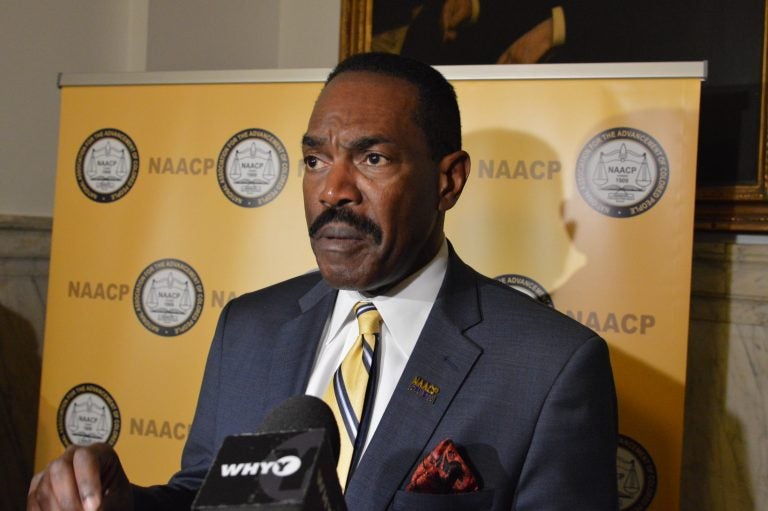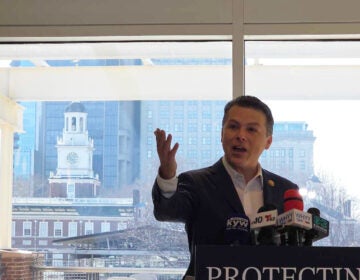Philly NAACP president paid as Kenney campaign consultant
Kenney’s political committee, Kenney for Philadelphia, has paid Philadelphia NAACP President Rodney Muhammad $95,000 for “consulting services” since 2017.

Philadelphia head of the NAACP Rodney Muhammad speaks at City Hall. (Tom MacDonald/WHYY)
This article originally appeared on The Philadelphia Tribune.
—
Mayor Jim Kenney’s re-election campaign can count on the continued support of the president of the Philadelphia NAACP.
That’s because Kenney is paying for it.
Kenney’s political committee, Kenney for Philadelphia, has paid Philadelphia NAACP President Rodney Muhammad $95,000 for “consulting services” since 2017, according to campaign finance reports.
On Kenney’s campaign payroll for years, Muhammad described his role with the campaign as “individual work” that was separate from his role with the NAACP. He said he shares his “social and political views” with the campaign, such as community needs and lowering recidivism among formerly incarcerated individuals.
Some have questioned Muhammad’s work with Kenney’s campaign, but Muhammad maintains that it is not a conflict of interest.
“I don’t speak for the campaign. I just talk to them,” he said. “I don’t tell people to vote for Jim Kenney. That’s not my job.”
The Kenney campaign starting paying Muhammad in 2017, said Harrison Morgan, a spokesman for Kenney’s re-election campaign, in an email.
That year, the campaign paid Muhammad $45,000, campaign finance reports show. It paid him $35,000 in 2018. And it paid $15,000 in the first few months of this year. All of the payments were made to Rodney Carpenter, Muhammad’s birth name.
“He [Muhammad] is a well-respected community leader who provides valuable input to the mayor regarding a wide variety of campaign matters,” Morgan said.
Asked what Muhammad was consulting the campaign on and whether that included Kenney’s 1.5-per-ounce sweetened beverage tax, Morgan described Muhammad as a “general consultant” who had “nothing to do with the beverage tax.”
Asked whether he will remain on the campaign’s payroll throughout the remainder of the year, Muhammad said he was not certain.
Micah Sims, a member of the city’s NAACP board, said the organization has been aware for years of Muhammad’s financial connection to Kenney.
Sims said the organization’s bylaws were silent on the issue of whether a board member can work for a campaign — “as long as it is not viewed as a conflict of interest.”
“It has not impacted the NAACP’s work nor stances when it comes to issues that are important to the African-American community in Philadelphia,” he said.
Aba Blankson, a spokesman for the NAACP’s national office, did not respond to a request for comment.
Muhammad, who has led Philadelphia’s NAACP since 2014, has failed to disclose his ties to Kenney in the past.
In 2016, Muhammad was paid to advocate for Kenney’s sweetened beverage tax on behalf of nonprofit Philadelphians for a Fair Future. The city’s Board of Ethics found that he had failed to register as a lobbyist. Muhammad maintained his position with the NAACP and did not disclose his paid role at the time.
The Board of Ethics fined Philadelphians for a Fair Future and other groups last year for “making material misstatements and omissions” in their registration and expense reports in 2016 when they were pushing for the sweetened beverage tax.
Muhammad’s profile on the Philadelphia NAACP website lists media outlets where he has appeared and that he “has worked with previous mayors fighting illegal gun sales and racial tensions in Philadelphia and Chicago,” but it does not mention his ties to the Kenney campaign.
And just last month, at an NAACP candidates forum where Kenney and other candidates presented their platforms to voters, Muhammad spoke to those in attendance but never mentioned his financial ties to Kenney.
Sims, also the local chapter’s political director, said he manages all political events to prevent any conflict of interest with Muhammad.
“It was imperative that this process that the NAACP has — in reference to doing political forums, et cetera — was not under the jurisdiction of the president,” he said.
Still, Muhammad’s ties to Kenney are a “glaring contradiction,” said Paula Peebles, state chairwoman of the National Action Network, a civil rights organization.
The Black community has serious issues with Kenney, Peebles said, including the Philadelphia Police Department’s use of stop and frisk, high crime rates, public safety and the 10-year property tax abatement.
“We have a mayor that has made policy positions that are in opposition to the very foundation that the NAACP stands for,” Peebles said. “It’s going to make it difficult for him [Muhammad] to be in the circle of community meetings because they’re just not going to trust him.”
Rev. Jay Broadnax, president of the Black Clergy of Philadelphia and Vicinity, said Muhammad’s connection to Kenney “does raise questions,” but described Muhammad as a “straight-up guy.”
David Thornburgh, CEO of the nonpartisan government watchdog group Committee of Seventy, said Muhammad’s relationship demands an extra layer of scrutiny and transparency.
“When you’re the prominent leader of a prominent community organization,” he said, “it’s a little hard to separate your personal interest from your organizational interest.”
WHYY is your source for fact-based, in-depth journalism and information. As a nonprofit organization, we rely on financial support from readers like you. Please give today.




